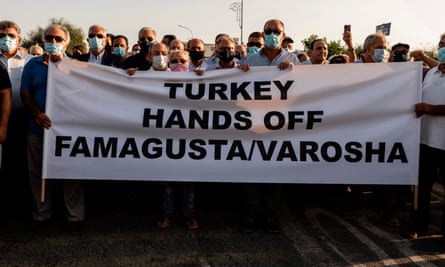The UN security council has been called on to address whether the opening of what was once the fabled Varosha beachfront in breakaway Turkish northern Cyprus is admissible under international law.
The council is expected to review the controversial decision, which Ankara encouraged on the eve of presidential elections in the territory, as criticism mounts both internationally and on the island itself.
Few places have so graphically conveyed a crisis frozen in time as the sandy strip of beach and the sealed off area of Famagusta behind it.
Fenced off 46 years ago when Greek Cypriots were forced to flee invading Turkish forces sent in following an abortive attempt to unite Cyprus with Greece, it has remained a ghost town ever since. For its inhabitants at the time, what was once the island’s most cosmopolitan resort has become resonant of the pain and frustration associated with the failure of peacemakers to resolve the Cyprus problem.

“This is a terrible day,” said Anna Marangou, a prominent Greek Cypriot archaeologist and historian whose family had owned a beachfront villa from which she and her relatives fled.
Like Marangou, who was 22 at the time, most Greek Cypriots left with only the clothes on their back - and often in little more than T-shirts, swimsuits, and flip-flops – as heavily armed Turkish troops landed on the island’s northern coast. About 150,000 Greek Cypriots were displaced from their homes in the summer of 1974, never to return.
Ankara, which views the “peace operation” as one of its greatest military campaigns, says it sent in forces to protect the country’s Turkish Cypriot minority after Athens orchestrated a coup.
The opening of Varosha before the resumption of peace talks squarely aimed at creating a bi-communal, bi-zonal federation also comes as Turkey pushes for a two-state solution on the divided island and steps up its defence of the enclave’s claims to offshore energy reserves.
Nicos Anastasiades, the president of the island’s internationally recognised and Greek-administered south, said the move was illegal and in “flagrant violation” of UN resolutions.

The EU’s foreign policy chief, Josep Borrel, and the UN secretary general, António Guterres, have expressed concern that it could heighten intercommunal tensions and undermine the chances of stalled negotiations to reunify the island in the coming months.
The reopening was announced this week at a news conference in Ankara attended by the Turkish president, Recep Tayyip Erdoğan, and the head of the Turkish Cypriot government, Ersin Tatar.
Media outlets in the self-styled Turkish Republic of Northern Cyprus reported that about 2,000 people had visited Varosha between midday and 5pm on Friday. Crowds were allowed access to the beachfront via a freshly asphalted road with police duct tape keeping pedestrians out of damaged buildings. Jubilant locals draped in Turkish and Turkish Cypriot flags were said to have described the moment as historic.
The beachfront is to remain open between 9am and 5pm every day.
Former Greek Cypriot residents of Varosha demonstrated on Thursday at one of the nine crossing points along the UN-patrolled buffer zone that divides the island.

“How can someone not be upset by what they have seen today,” said Famagusta’s Greek Cypriot mayor, Simos Ioannou. “Varosha should have been handed over to its rightful owners … this is psychological pressure.”
Athens also weighed in. It appealed for the decision to be reversed and said it would call for action at next week’s council of EU leaders in Brussels if it is not.
Greek analysts echoed officials in describing the reopening as a political stunt intended to shore up nationalist forces that Ankara openly backs before Sunday’s poll.
Russia has also said the move was unacceptable.
If the diplomatic dispute over Varosha escalates it will put further strain on relations between Greece and Turkey, which are already tense over the search for gas deposits in the eastern Mediterranean.